Lenovo’s Yoga line of 2-in-1 laptops has long built a good reputation for being one of the top options for those looking for versatile, creativity-focused Windows laptops.
They bring with them the Yoga line’s signature convertible design language which features 360-degree hinges, touchscreens, and even styluses.
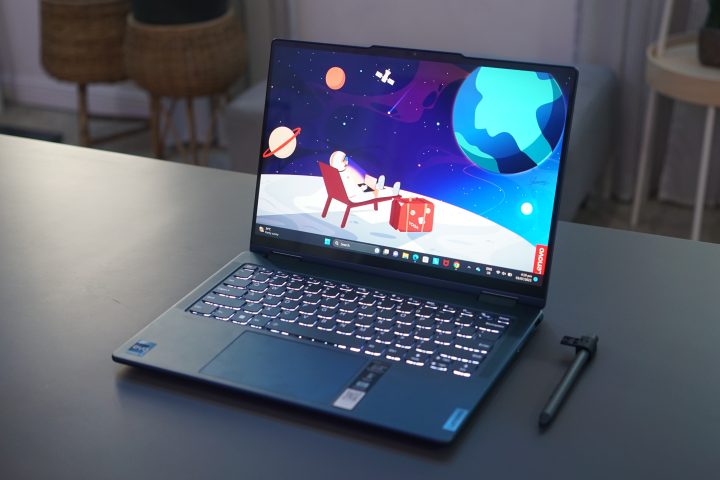
And with their latest offering, the Lenovo Yoga 7 (14IRL8), Lenovo looks to continue their roll of solid 2-in-1’s in the Windows laptop space.
Let’s check out the all-new Lenovo Yoga 7 (14IRL8) in our hands-on review!
Table of Contents
Before we begin, this hands-on review comes from a perspective of a young professional who mainly uses a laptop to write and do research, browse social media, consume video content, and do other productivity-focused tasks.
As much as I would love to be a creative professional, my hands-on with Yoga 7 is limited to the above activities.
With that out of the way, let’s start with design and construction.
My initial thoughts on the Lenovo Yoga 7 were about how solid it felt. Coming into my testing, I had the assumption that maybe Lenovo would skimp out on the build given that their engineering money may focus more on the hinge and the screen. Well, I was definitely wrong.

The Yoga 7 features an aluminum top and bottom that gives it a nice heft in terms of weight. Pressing onto different parts of the laptop shows a very tightly-engineered chassis that gives minimal flex and inspires confidence in everyday use.
Our review unit comes with this Tidal Teal colorway, with the Yoga 7 also coming in Storm Grey.
We appreciate the minimalist design of the Yoga 7. However, the tidal teal colorway on our laptop collects a ton of fingerprints and is very sensitive to oils. So if that’s something that bothers you, grey might be the better option.

The Yoga 7 comes with a unique design choice in that it features rounded edges on all sides of the laptop. When most machines come with chamfered, squared-off edges, the choice to go with the rounded edges does actually make a positive difference as it makes holding the laptop on the sides much more comfortable.

Of course, we’d be remiss if we didn’t mention one of the Yoga 7’s flagship features and that’s its hinge.
In our use, the 360-degree hinge always felt solid and strong. Never once did it feel too loose or too hard to change in its different modes. With the hinge, you can orient the Yoga 7 in three ways: laptop mode, stand mode, and tablet mode.
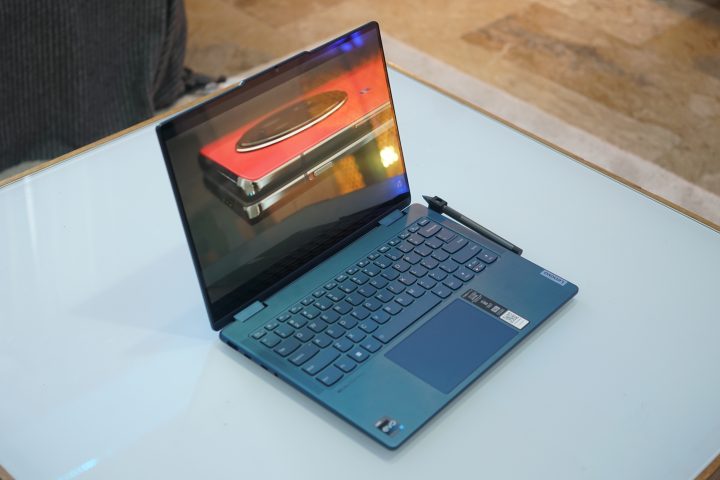


The hinge was able to easily support all three and not once did I experience any bottleneck when in use. Of course, year-long use may tell a different story but with our testing, it seems to be built to last.
The Lenovo Yoga 7 also comes with Lenovo’s Digital Pen (which we’ll delve into more later). We highly appreciate the fact that Lenovo includes a holder/adapter for the stylus, allowing users to store the pen by plugging it into the USB-A port.

One nitpick I do have with the Lenovo Yoga 7’s design is that it sort of feels too plastic-y for my taste. Despite the aluminum design, the coating doesn’t exactly give off that more premium feel you get with more top-of-the-line metal.
Otherwise, the design of the Lenovo Yoga 7 is really, really good.
For the display, the Lenovo Yoga 7 comes with a 14-inch WUXGA OLED TS glossy display. It has a 60 Hz refresh rate and comes with multi-touch, 10-point touch support.

The display on the Yoga 7 is undeniably beautiful. It gets plenty, plenty bright and the color reproduction and vibrance is of the highest quality.
I guess we shouldn’t be surprised given that it’s an OLED panel. The viewing angles on the Yoga 7 are also excellent, with no reduction of quality even with viewing the laptop at an angle. This is perhaps more important since the Yoga 7 is designed to be used at different angles and hinge positions.
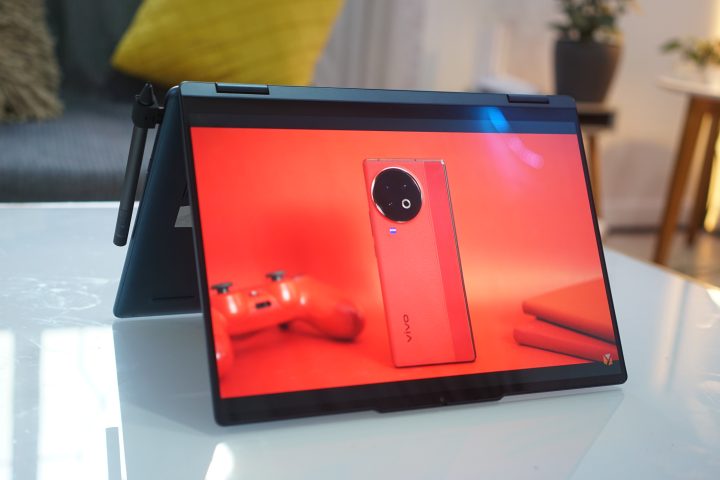
The touchscreen on the other hand is also good, with an almost instant response – similar to that of a modern smartphone. Speaking of the touchscreen, we also get Lenovo’s Digital Pen with the Yoga 7. It comes with an included replaceable AAAA alkaline battery and features 4096 levels of pressure sensitivity.

As mentioned earlier, I’m not much of an artist myself but when I used the pen to do so quick doodles it was incredibly responsive and played really well with the Yoga 7’s touchscreen. The palm rejection did miss a few times, requiring me to re-do some touch inputs here and there, but the overall experience with using the stylus is still really nice.

More creative users will definitely appreciate the stylus and touchscreen combo that the Yoga 7 has going for it.
The Yoga 7 also has a 1080p webcam camera at the top, which we found to be decent and more than usable. It even has a privacy shutter, which is a definite plus in this day and age of hacking and alleged surveillance so props to Lenovo for that!

Last, and certainly not least, is the Yoga 7’s speakers. The Yoga 7 features a stereo speaker setup that gave me one of the best speaker experiences I’ve ever had from a laptop.

The sound was surprisingly full, offering really high-quality audio at decently loud volumes. It also really helps that the Yoga 7’s speakers are intuitively placed right on the sides of the keyboard, facing the user.
With the amazing display and great speakers, I honestly thoroughly enjoyed using Yoga 7 for content consumption.
The good things continue with the Yoga 7’s keyboard and mouse. Starting off with the keyboard, we get a really nice standard layout of keys on the Yoga 7.

Each key has good travel and none of them ever felt too sticky or too soft, making typing a really comfortable experience on the day-to-day.

I also appreciate that Lenovo gives us LED backlighting on the keyboard, with two levels of brightness.
On the trackpad side, the Yoga 7 also gets good marks. The Yoga 7 features a buttonless glass-like Mylar surface touchpad that gives really consistent and solid clicks on all parts of the touchpad.

I had no trouble using both the right and left clicks and never really experienced any missed presses in my testing. Props to Lenovo as well for making the touchpad feel solid as well, with the clicks never feeling hollow or cheap during use.
For performance, the Lenovo Yoga 7 (14IRL8) is powered with up to a 13th Gen Intel® Core™ i7-1360P processor, 8 or 16 GB of onboard LPDDR5 5200 memory, and a 512 or 1TB M.2 2242 SSD. It also has Intel Iris Xe integrated graphics.
Our review unit has 16GB of RAM and 1TB of internal storage variant.

As expected from a top-of-the-line processor, the Lenovo Yoga 7 flies. Using the Yoga 7 for 5-7 multiple Google Chrome browsers, research, writing text on Google Docs, and playing music on Spotify – all at the same time was not a problem for the Yoga 7.
It never lagged on me or crashed abruptly. I was even able to handle multiple desktops when I was handling multiple (but different) projects running at the same time. It also never got too warm under heavier loads.

Of course, it’s not a gaming machine and it only has Iris Xe graphics so it’s not gonna compete with any gaming laptop out there. However, the Lenovo Yoga 7 is going to be fast and zippy for everything else.
For benchmarks, here are the results we got from the Yoga 7:



We also tried running Valorant on the Yoga 7 and surprisingly, at Low on all settings, it handled the game really well with only a bit of screen tearing and almost no lag from the laptop.
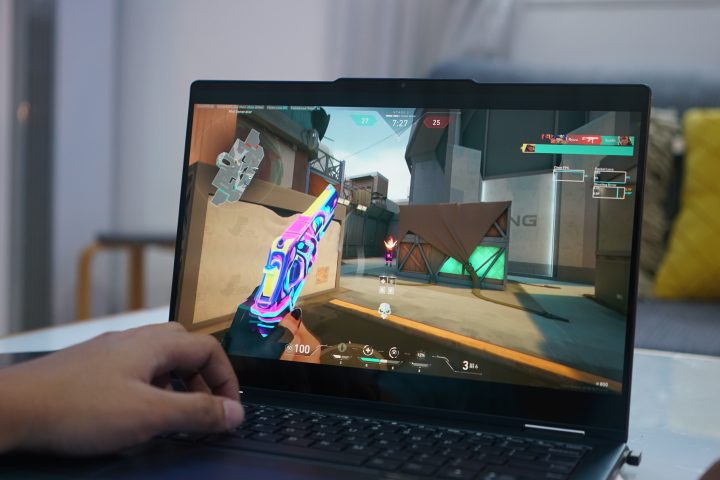
Overall, the Yoga 7 performs just as you’d expect with its given CPU – fast, smooth, and quick. It’s going to be a good machine for both productivity-focused tasks and more creative workflows.
For ports, the Lenovo Yoga 7 comes with one USB 3.2 Gen 1, two Thunderbolt 4, one HDMI 1.4b, one microSD card reader, and a headphone/microphone combo jack (3.5mm).

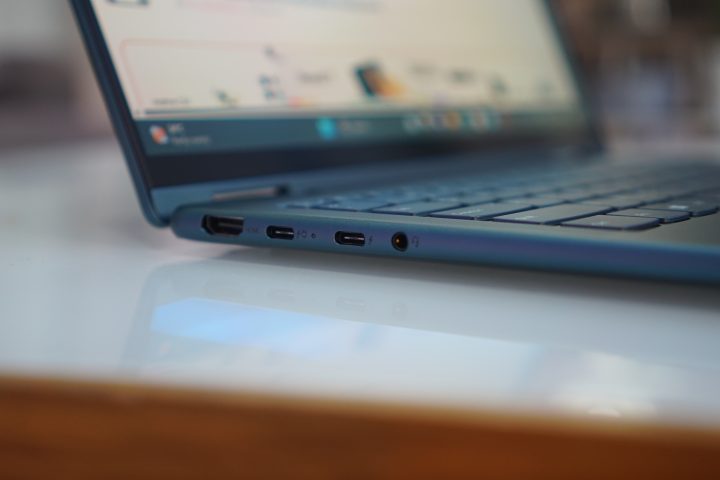
Personally, I was disappointed to find out that the Yoga 7 only has one USB-A port. As somebody who regularly uses a wireless mouse with a dongle and USB-powered speakers, I had to choose between the two.
The setup would honestly be perfect if it had one more USB-A port on deck.
For battery, the Yoga 7 comes with a 71-watt-hour battery. In my testing, the laptop lasts around 9 to 9 and a half hours of use.

That’s mostly doing writing and research with Google Docs and multiple Chrome tabs open, as well as watching the occasional hour-long stream from my favorite content creators that I watch on YouTube.
All in all, the Lenovo Yoga 7 14IRL8 is a really solid machine for those looking for a 2-in-1 laptop that has an amazing screen, great performance, and good battery life – all while having a touchscreen and an included stylus.

While I would have loved another USB-A port and a more “metal-feeling” design, these are mere nitpicks to what’s overall a really good convertible package.
In terms of price, you can purchase the Lenovo Yoga 7 (14IrL8) for around Php 76,995USD 1,312INR 111,227EUR 1,250CNY 9,555 at Datablitz 17.
Specs and Pricing:
Lenovo Yoga 7 14IRL8 specs:
14-inch WUXGA OLED TS Glossy Display
60Hz Refresh Rate, VESA DisplayHDR™ True Black 500, TÜV Low Blue Light, Dolby Vision™
OGM Multi-touch, supports 10-point touch
13th Gen Intel Core i7-1360P
Intel Iris Xe Graphics
8, 16 GB LPDDR5-5200 RAM
512GB, 1TB M.2 2242 SSD
Multi-mode: laptop, stand, and tablet mode supported by 360° hinge
Lenovo Digital Pen with replaceable AAAA alkaline battery, 4096 levels of pressure sensitivity
Buttonless glass-like Mylar® surface multi-touch touchpad
FHD 1080 + IR camera with privacy shutter
microSD card reader
Stereo speakers, 2W x 2, optimized with Dolby Atmos
Dual-microphone array with noise-cancelling
Wi-Fi® 6E, 802.11ax 2×2 Wi-Fi + Bluetooth 5.1, M.2 card
Standard Ports
• 1x USB 3.2 Gen 1 (Always On)
• 2x Thunderbolt 4 / USB4® 40Gbps (support data transfer, Power Delivery 3.0 and DisplayPort™ 1.4)
• 1x HDMI 1.4b
• 1x microSD card reader
• 1x Headphone / microphone combo jack (3.5mm)
USB Type-C
Windows 11 Pro, Windows 11 Home, Windows 11 Home Single Language
71Wh battery, with support for Rapid Charge Express (3 hrs of run time with 15-minute charge)
317.87 x 222.50 x 16.49mm (12.51 x 8.76 x 0.65 inches)
OLED model – 1.49 kg (3.28 lbs)
Tidal teal, Storm grey
Pricing:
What we liked:
What we didn’t like:

YugaTech.com is the largest and longest-running technology site in the Philippines. Originally established in October 2002, the site was transformed into a full-fledged technology platform in 2005.
How to transfer, withdraw money from PayPal to GCash
Prices of Starlink satellite in the Philippines
Install Google GBox to Huawei smartphones
Pag-IBIG MP2 online application
How to check PhilHealth contributions online
How to find your SIM card serial number
Globe, PLDT, Converge, Sky: Unli fiber internet plans compared
10 biggest games in the Google Play Store
LTO periodic medical exam for 10-year licenses
Netflix codes to unlock hidden TV shows, movies
Apple, Asus, Cherry Mobile, Huawei, LG, Nokia, Oppo, Samsung, Sony, Vivo, Xiaomi, Lenovo, Infinix Mobile, Pocophone, Honor, iPhone, OnePlus, Tecno, Realme, HTC, Gionee, Kata, IQ00, Redmi, Razer, CloudFone, Motorola, Panasonic, TCL, Wiko
Best Android smartphones between PHP 20,000 - 25,000
Smartphones under PHP 10,000 in the Philippines
Smartphones under PHP 12K Philippines
Best smartphones for kids under PHP 7,000
Smartphones under PHP 15,000 in the Philippines
Best Android smartphones between PHP 15,000 - 20,000
Smartphones under PHP 20,000 in the Philippines
Most affordable 5G phones in the Philippines under PHP 20K
5G smartphones in the Philippines under PHP 16K
Smartphone pricelist Philippines 2024
Smartphone pricelist Philippines 2023
Smartphone pricelist Philippines 2022
Smartphone pricelist Philippines 2021
Smartphone pricelist Philippines 2020